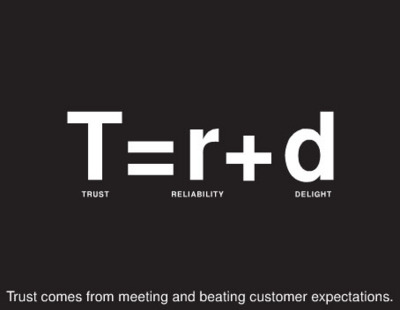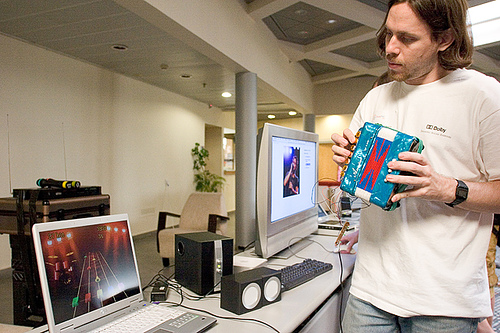
It’s official: I handed my two weeks’ notice to Tucows on Monday. After four and a half years as their developer relations guy, during which time I held two titles (Technical Evangelist, and before that, the less wieldy Technical Community Development Coordinator), worked in two departments and occupied 5 different desks spread across two floors, I have decided to move on to a new job and with it, new challenges.

Networking accordion-style during a break at BloggerCon II in Boston (that’s Mass Ave. in the background, and yes, I’m wearing a cow-print vest).
Photo courtesy of Julie Leung.
Maybe it’s the whole “turning 40” thing, or maybe it’s the programming itch, but I feel that I need a change of scenery. Life at Tucows was pretty sweet, but I came across one of those rare — if a little bit risky — opportunities that life doesn’t hand you too often. As much as I loved my job at Tucows, I’d be have to be a fool and a coward to pass up the opportunity I’m about to take on.

My first desk at the Tucows office, taken Fall 2003.

Me at my second desk at the Tucows office, taken Winter 2004.

My third desk at the Tucows office, taken Spring 2006.

The view from my fifth desk at the Tucows office, taken Fall 2007.
The decision to leave Tucows was not an easy one. In many ways, the Technical Evangelist position was a dream job. It combined a number of things I love to do: programming, writing, schmoozing, graphic design and I even got to work in a little accordion playing. I’ve worked with some of the finest colleagues I have known, I’ve reported to some excellent bosses — first Ross Rader, then Ken Schafer, and finally Leona Hobbs, and for a CEO who is admired and respected throughout high tech, Elliot Noss.
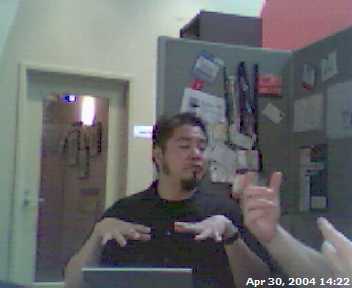
A still from the webcam broadcast (no audio) of my first annual review, Spring 2004.
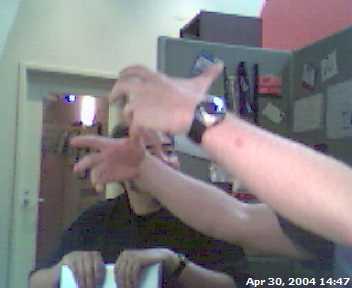
A still from the webcam broadcast (no audio) of my first annual review, Spring 2004. Those are Ross Rader’s hands.
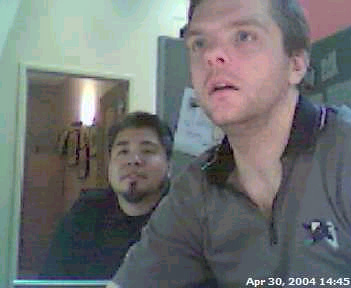
A still from the webcam broadcast (no audio) of my first annual review, Spring 2004. That’s Ross Rader on the right.
One of the best things about my job was having the privilege of wearing the mantle of Tucows, a company that’s well-regarded in the world of high-tech. Walking into a room of techies and saying “I’m with Tucows” is like traveling through Europe with a Canadian flag sewn on your backpack, walking through Boston with a Red Sox cap or being able to play Take Me Home Country Roads on accordion in front a room of West Virginians — it establishes your bona fides and marks you as one of the good guys. I hope that Tucows has benefited equally from having the “Accordion Guy” as its head tech cheerleader.

Representing Tucows at a geek function at No Regrets with the accordion.

Speaking at the “Business of Blogging” seminar at IBM’s CASCON 2005.

A still from a CTV News piece on Google.
I’d like to thank my first Tucows boss, “Boss Ross” Rader, and his boss Elliot Noss for believing in me enough to hire me, and the two bosses who followed, Ken Schafer and Leona Hobbs, for being equally terrific. I’d also like to apologize to Leona for handing in my notice while she was on vacation (you know how it is with “windows of opportunity”). I also have to thank my teammates in Communications, Hasdeep Kharaud, Kari Dykes and James “Yes, that’s my real surname” Koole; it’s been a blast working (and lunching at Pho Asia 21) with you guys. Hell, I’m just going to thank the everyone in the company for making my four and a half years there an enjoyable experience.

Playing accordion at the evening keynote at RailsConf 2007 in Portland, Oregon.

At DemoCamp. “Amber’s being unprofessional again, isn’t she?”

Talking about Windows Vista on CityTV News, early 2007.

Flying the Tucows flag at the php|works conference, 2006.
My final day at the office will be next Tuesday, the 20th. I leave Tucows with mixed feelings: happy and excited about my new position (which I’ll talk about later) but sad to leave a great workplace and the company for whom I’ve worked the longest in my entire career. It’s been a great ride, guys — thanks!

